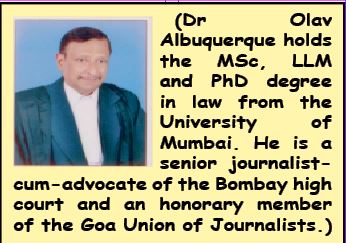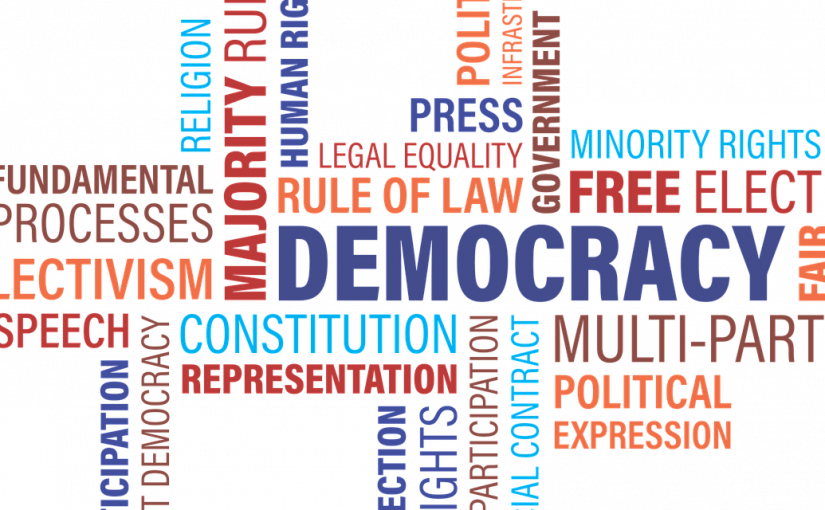By Dr Olav Albuquerque
When the ruling government does its best to muzzle the Opposition?
AS we near the year-end, with parties and cul-culs doing the rounds in Goa, it is time we reflect on what is happening to our country which is a macrocosm about what is happening in our beloved Goa. The senior-most judge of the Supreme Court, Justice Rohinton Nariman, who gave a talk at the Asiatic Society of Mumbai, where I am a life member declared the BBC’s two documentaries on our Prime Minister Narendra Modi was promptly banned for viewing in the country.
What is more is that the BBC was saddled with tax raids and other forms of harassment which indirectly abridges their right to disseminate information. This is for the simple reason that when a business entity is busy fighting the government for alleged tax evasion or whatever else the government says it has done or failed to do, it cannot focus on its primary duty of disseminating information to the people.
Coming in the wake of the 141 MPs who have been banned from Parliament, an aspect which the learned judge did not touch upon, is the fact that the government substituted its own minister for the Chief Justice of India as part of a committee to be set up to select the Chief Election Commissioner |(CEC|). The original Committee to select the CEC was the CJI, Prime Minister Narendra Modi and the leader of the Opposition. Now, the CEC, as we all know, is the Constitutional authority charged with ensuring free-and-fair elections are held. When the government substitutes its own hand-picked minister for the CJI, we all know what to expect.
The next worrisome aspect, according to Justice Nariman, was the fact that the Governor of Kerala Arif Mohammed Khan, which was traditionally ruled by the Left parties, refused to give his assent to eight bills passed by the legislature. We all know that the governor has to give his assent to the bill if it is passed a second time by the Legislature. Or he has to resign. But the Governor of Tamil Nadu RN Rav did something which was unexpected. He gave his assent to one bill and referred the remaining to the president for her assent (or refusal to give assent).
Justice Nariman explained the issue very well in the Asiatic Society of Mumbai by explaining that if these bills are referred to the Central government which may refuse to allow the passage of these bills, that amounts to the death of that bills. And consequently, there is a standstill of the passage of legislative bills by the Kerala legislature.
16 JOURNALISTS
NOW, there are 16 journalists jailed under the Unlawful Activities Prevention Act, of which one was acquitted and another was discharged due to lack of evidence. But some others still continue to remain in jail which gives justification for the downgrading of India to 161 in the Freedom of Press Index published by Reporters Without Borders for the year 2023, down from 150 the previous year.
Shockingly, our neighbors like Bhutan, Sri Lanka, Pakistan, Afghanistan and Bangladesh ranked 90, 135, 150, 152 and 163 respectively for the year 2023 which is a poor reflection on how our domestic press functions. On Jammu & Kashmir, Justice Nariman alleged Jammu & Kashmir was bifurcated because the government allegedly wanted to bypass article 356 (5) which deals with circumstances in which there is a Constitutional breakdown in a state and the Centre takes over.
If there is a national emergency or the Election Commission says free-and-fair elections are not possible neither of which was possible. “The ingenious method of bypassing this was to bifurcate Jammu & Kashmir into two Union territories which means there is was no democratic government in that region. The Supreme Court did not decide this question,” said Justice Nariman.
Justice Nariman pointed out that Solicitor General of India Tushar Mehta assured the Supreme Court that free-and-fair elections would be held in Jammu, Kashmir and Ladakh. The assurance of Tushar Mehta that statehood would be restored to the bifurcated Jammu, Kashmir and Ladakh by next year has not much meaning, according to Justice Nariman.
The retired judge pointed out that the solicitor general could neither bind future governments nor the legislature he does not represent. The solicitor general who is subordinate to the attorney general of India can bind only the present government whom he advises and whom he represents in the Supreme Court. Hence, to evade Constitutional questions thrown up on the mere assurance of the solicitor general raises very serious questions.
The passage of the bills to substitute the present criminal justice system by the new legislation took place without much debate because of the absence of 141 Opposition MPs. Rahul Gandhi is busy fighting criminal defamation cases against him while the feisty Trinamool Congress MP Mahua Moitra has been expelled from Parliament for allegedly being anti-national on the gifts-for-password scam. She has filed a petition in the Supreme Court challenging her expulsion.
The points raised by Justice Nariman are pithy and witty. This makes us realize that we are living in a state where total freedom is not available to us and where majoritarianism is disguised as nationalism so that patriotism is given a go-by. Be that as it may, with journalists and Opposition MPs reduced to fighting court cases after they have been stymied and expelled from Parliament, there is no opposition for the bills passed in Parliament.
IN GOA
AND in Goa, the situation is not very different. Goa Chief Minister Dr Pramod Sawant exhorted journalists on November 16 to focus on the “mistakes made by NGOs.” When a former president of the Goa Union of Journalists, Ashley do Rozario pointed out that a journalist was permanently banned from entering the Goa legislative assembly just because a can of Budweiser beer was found in his backpack, the CM had no reply. He left the venue without waiting for the regular photo-ops session with the winners of the awards distributed by the government on National Press Day.
Mayabhushan Nagvekar’s departure from journalism is a huge loss to journalism, according to Ashley do Rozario. He was expelled from the legislature when Pramod Sawant was the speaker of the house.

